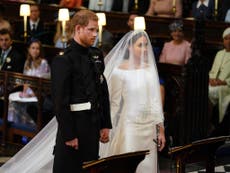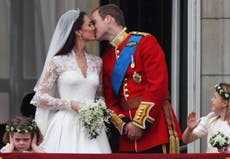Even if you're not Meghan Markle, everyone has something to say when you don't want your dad to walk you down the aisle
So many people still have a problem with a feminist wedding, and it starts with the expectation that permission for the engagement will be sought from the bride’s father


Meghan Markle has enough to deal with – not only is she planning not just a wedding (stressful at the best of times, which I can tell you as someone who is currently in the throes of planning a wedding scheduled to go ahead this summer) but she’s planning one that will be scrutinised by millions of people around the world.
Now she is facing the prospect of having one of her close family members miss that very wedding, with her father reportedly set to undergo heart surgery which will leave him unable to leave the hospital. This is, of course, hot on the heels of various controversies including the accusation that he colluded with the paparazzi to put “positive images” of himself out into the world.
Much has been made of the fact that this means Meghan Markle won’t be walked down the aisle in the traditional manner, and won’t be given away by her dad. In effect, the future royal is on the way to holding a feminist wedding without planning to.
That’s some feat, given how difficult it is to consciously organise a wedding and stick to the most basic of feminist principles. Because the truth is that when it comes to weddings, sometimes even the most strident feminists can go a little patriarchy-pandering.
Getting married is one of the oldest traditions in the world – and it shows. So many elements of (traditional, heteronormative) weddings have sexist overtones, probably because they are based on sexist ideas, which centre on the concept of woman as object. This particular idea has largely been consigned to the past – even the most defensive men’s rights activist would probably admit that the notion is problematic these days. But all the other progress that’s been made goes out the window once a couple decide to make a public promise of commitment.
It starts with the expectation that permission for the engagement will be sought from the bride’s father. It astounds me that people still actually do this and think it’s OK. It’s completely pointless, for one thing – have many marriages actually been stopped after a parent said no? – and, for another, adhering to this symbolic gesture is not in any way helpful to the equality cause. It’s a strange, infantilising way to embark on what most people see as a mature step firmly into the world of grown-ups, and it makes no sense.
Then there’s the case of giving the bride away. The problem is right there, in four little words. Can a person be given away, like a bag of old clothes or a box of books? No, they cannot. So why is this the most abiding part of the ceremony?
For me, this has been the biggest problem. As someone who has grown up in the belief that I’m equal to anyone of the opposite sex, and conduct my relationships as such, the idea of my father giving me away to my husband-to-be just doesn’t sit right. Luckily, my dad feels the same way, so he doesn’t expect to walk me down the aisle at my wedding.
Other people find this somewhat remarkable. (Other people have a lot of views when it comes to weddings, and they’re more than happy to share those opinions – that’s something you find out pretty much as soon as you’re engaged.) There’s concern, possibly real, that not having your dad walk you down the aisle indicates some sort of deep, dark family feud. The fatuous “but it’s tradition” brigade come out in their droves whenever they hear that you actually have quite a nice relationship with your father but don’t fancy clinging to that particular piece of sexist history, and then there’s the others who don’t even try to convince you but just immediately express outright disapproval. All this for a walk that will take about 30 seconds, 45 if I fall.
Of course, this is all preparation for the questions that inevitably follow about The New Name. This actually begins pre-wedding and it’s astounding how many people still assume that I’ll be making the change.
“What will your new name be?” they ask.
“Dunno, depends what I’m reincarnated as,” I reply.
It’s up to the individual what they choose to do in this regard, but it’s been a bit disappointing to note the new trend of brides rushing to change their names on social media often before the sun has set on their wedding day. Then again, if they don’t hustle, they’re inviting comments along the lines of “When are you rebranding? Need to make it official!” Because signing legal documents apparently isn’t enough.
None of these issues are seriously problematic, otherwise feminists would just stop getting married. But in 2018, it feels like making tweaks so as to have a wedding that’s a bit more equitable should not be cause for controversy, complaint or even comment.
If Meghan Markle’s wedding is viewed as a feminist one, it might make it easier for the rest of us to get on with walking up aisle without feeling like we’re walking into the past.





Join our commenting forum
Join thought-provoking conversations, follow other Independent readers and see their replies